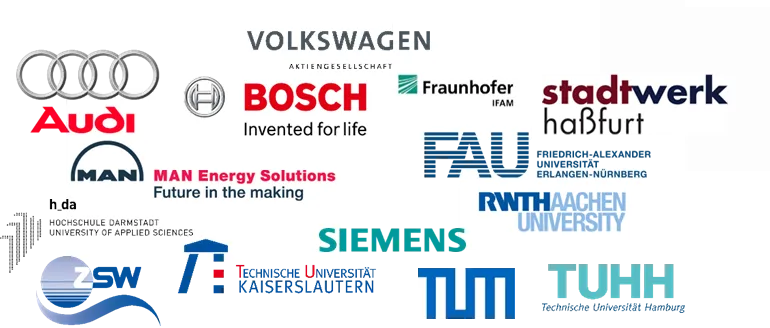E2Fuels
Motivation
While the medium-term expansion targets for renewable energies in the electricity sector of 35 % by 2020 have already been achieved ahead of schedule with 35.2 % in 2018, the share of renewable energies in the transport sector is declining. It was only 5.2 % in 2017 and is likely to fall short of the medium-term target of 10 % by 2020.
For this reason, significant efforts and interdisciplinary, new approaches are needed to increase the share of renewable energies in the transport sector and reduce greenhouse gas emissions. Synthetic fuels represent a promising approach. These are synthesized with electricity from renewable energies incorporating CO2 and can be used in stationary and mobile applications. Therefore, they enable the use of solar and wind energy in the transport sector. At the same time, synthetic fuels can contribute to the flexibilization and integration of fluctuating renewable energies in the electricity sector. However, these fundamental advantages are offset by the fact that synthetic fuels are not yet economical competitive compared to fossil fuels. In consequence, further technological innovations are needed both in their production and application.
Goals
The task of the Chair of Energy Systems is to model the production of synthetic fuels and to integrate them optimally into the German energy system. For this purpose, the entire path from the integration of renewable electricity to the platform chemicals hydrogen, methane and methanol is modelled thermochemically. The focus lays on the electrolysis and various synthesis routes. In order to achieve the highest levels of efficiency, perfect integration of heat and by-products is indispensable without neglecting plant flexibility. With the help of an optimization algorithm, the size of the buffer storage tanks and the component size of the plant are optimized via application planning. In a model of the German/European energy system, interactions and synergy effects on other sectors are evaluated. This holistic approach promises a sustainable design for the production of synthetic fuels.
In addition, the Chair of Energy Systems coordinates the submodule "System Analytical Investigations". Partner chairs at the TUM investigate the production of the extremely low-emission fuel polyoxymethylene-dimethyl-ethers and prepare a life cycle analysis for synthetic fuels. The Fraunhofer Institute and the ZSW Baden-Würtemberg are investigating current and future developments in the key technology of electrolysis and CO2 sources.
A total of 16 partners from industry and research are working on the E2Fuels project. Among other things, a pilot plant with a novel process for methanol production is being built. The project concentrates on applications in road traffic, in stationary industrial applications and in the maritime sector. Research areas include innovative injection systems for passenger cars, demonstration vehicles, flexible gas engines in industry and methanol infrastructures at ports.
Sponsors
The project E2Fuels is funded by the German Federal Ministry of Economics and Energy (BMWi) under the number 03EIV011G as part of the research initiative "Energiewende im Verkehr".
Partners
- Audi AG
- Robert Bosch GmbH
- MAN Energy Solutions SE
- MAN Truck & Bus AG
- Siemens AG
- Stadtwerke Haßfurt GmbH
- Volkswagen AG
- Frauenhofer IFAM
- Zentrum für Sonnenenergie- und Wasserstoff-Forschung Baden-Württemberg (ZSW)
- FAU Erlangen-Nürnberg
- Hochschule Darmstadt
- RWTH Aachen
- Technische Universität Darmstadt
- Technische Universität Hamburg
- TU Kaiserslautern
- Technische Universität München

